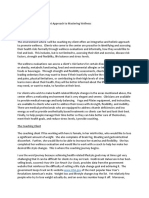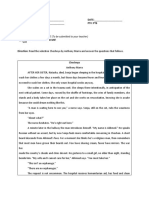Health Coaching
Health Coaching
Uploaded by
Javiera Fuentes CerutiCopyright:
Available Formats
Health Coaching
Health Coaching
Uploaded by
Javiera Fuentes CerutiCopyright
Available Formats
Share this document
Did you find this document useful?
Is this content inappropriate?
Copyright:
Available Formats
Health Coaching
Health Coaching
Uploaded by
Javiera Fuentes CerutiCopyright:
Available Formats
Health coaching to facilitate the promotion of healthy behaviour and achievement of health-related goals
91
PRACTICE BRIEFING
Health coaching to facilitate the promotion of healthy behaviour and achievement of health-related goals
By Stephen Palmer, Honorary Professor of Psychology, City University; Director of the Centre for Coaching, London, UK; Irene Tubbs, Senior Lecturer, Centre for Coaching, London, UK; and Alison Whybrow, Consultant, Centre for Coaching, London, UK.
Key words: health coaching, coaching for health, stress management coaching, health-related goals, cognitive behavioural.
Abstract
Coaching has become acceptable to both business and individuals to help improve performance, manage stress and achieve work and personal goals. Yet very few papers have been published with a specific focus on health and coaching. This paper highlights the possible role of coaching to facilitate the promotion of healthy behaviours and to help individuals achieve their health-related goals.
them to learn rather than teaching them a facilitation approach (Whitmore 1992, based on Gallwey, a tennis expert). 2 Coaching Directly concerned with the immediate improvement of performance and development of skills by a form of tutoring or instruction an instructional approach (Parsloe 1995). 3 Coaching The art of facilitating the performance, learning and development of another a facilitation approach (Downey 1999). Psychologists have developed another variation: 4 Coaching psychology is for enhancing wellbeing and performance in personal life and work domains with normal, non-clinical populations, underpinned by models of coaching grounded in established adult learning or psychological approaches (adapted Grant and Palmer 2002). It can probably be assumed that these definitions should reflect the nature of coaching as practised by many practitioners. Therefore the key aspects of coaching, depending upon the model of coaching being applied, appear to include enhancing wellbeing, learning, facilitation, tutoring, instruction, development of skills and improving performance. In addition, coaching is usually goal and solution focused (Grant 2001).
The practice of personal, life, business, sports, performance and executive coaching has grown substantially since the early 1990s (Cockerill 2002, Fournies 2000, Neenan and Palmer 2001, Parsloe and Wray 2000, Peltier 2001). Although the term coach has been borrowed as a metaphor from sport, it is now applied to the personal and work domains. Thus the term coaching has entered into the public psyche beyond the sports pages of the national newspapers and is becoming generally accepted as beneficial to its recipients. It can even be seen as trendy having your own personal life coach. Whereas, in the United Kingdom, there is still a stigma attached to seeing a counsellor or psychotherapist.
Health coaching
Similar to health education specialists, usually the coach takes an active and directive role. Generally, the coach helps the coachee to achieve their goals by facilitating the learning process. If health coaching or coaching for health is the focus, the coach may help to educate the coachee on specific health-related topics and subsequently support them in achieving
What is coaching?
There are many definitions of coaching. Four are summarised below: 1 Coaching is unlocking a persons potential to maximise their own performance. It is helping
International Journal of Health Promotion & Education Volume 41 Number 3 2003 9193
Introduction
92
Health coaching to facilitate the promotion of healthy behaviour and achievement of health-related goals
their health-related goals. As the term coaching is becoming acceptable to the public, the concept of health coaching could be more favourably received by a client group in contrast to attending a health education lecture. An established health-related professional body, the Institute of Health Promotion and Education, provides a definition of health promotion and health education in their constitution:
The practice of health promotion and health education may be described as the organisation and execution of the influences affecting the environment, as well as individual knowledge, attitudes and behaviour, in matters concerning health with a view to enabling communities and individuals to maintain and promote personal and community health and wellbeing, together with a proper acceptance and use of the health and medical services available. (IHPE 2002)
Health Inhibiting Thinking (HITs) and Health Enhancing Thinking (HETs).* Cognitive techniques such as Socratic questioning could be used to help a client to modify their thinking (Neenan and Palmer 2001). Examples of HITs and, following modification, their corresponding HETs are illustrated below: HIT: Exercise makes me sweat, so it cant be good for me. HET: Sweating isnt a pleasant feeling but I know it is good for me because it takes all the waste products out of my body, allowing energy to flow better. HIT: Ive got to eat something to stop me being upset. HET: Im allowed to be upset, but what am I getting upset for? I can do this without bingeing. HIT: I cant stand this pain. I need more medication. HET: This pain is bad at times, but I can stand it. Im living proof I can stand it. When I use deep breathing or distraction exercises the pain eases. HIT: I must get a prescription when I leave or they will think I am faking it. HET: I need the doctor to acknowledge that the way I feel is real. This would integrate standard cognitive behavioural techniques into health coaching (Neenan and Palmer 2001).
International Journal of Health Promotion & Education Volume 41 Number 3 2003 9193
This definition does not conflict with the general principles of the coaching approach, although its focus is on health and it can also be at the community level. This would be similar to stress or stress management coaching that is now available. The International Stress Management Association (UK) has recognised the practice of this form of coaching for a number of years. It could be argued that stress management training and stress management coaching comes under the umbrella of the health education field. Another professional body, the Association for Coaching (2003), includes both stress management coaching and health coaching on its website as Speciality Coaching. Thus the term health coaching is entering into general public awareness, although not necessarily among mainstream health education or promotion specialists. Within the field of health, papers have been published on behavioural counselling which has been used to educate clients with coronary heart disease (Steptoe et al 1999). Interestingly, the counselling is active and directive in nature and takes an educational approach which could be more accurately described as instructional coaching. A tentative definition of health coaching is given below:
Health coaching is the practice of health education and health promotion within a coaching context, to enhance the wellbeing of individuals and to facilitate the achievement of their health-related goals.
Conclusion
With the increasing interest in coaching, the introduction of health coaching or coaching for health may have an appeal across different generations. However, there is a lack of published research that underpins the effectiveness of health coaching. Although many models of coaching exist (Bluckert 2003), the application of models to health coaching which take an educational approach, such as cognitive-behavioural or multimodal, may provide promising results (Neenan and Palmer 2001, Palmer et al 2003).
References
Association for Coaching (2003). Association for Coaching website: http://www.associationforcoaching.com. Bluckert, P (2003). Typology of Coaching and Mentoring. Draft . 1. London: European Mentoring and Coaching Council. Cockerill, I. (2002). Solutions in Sport Psychology. London: Thomson. Downey, M. (1999). Effective Coaching. London: Orion Business Books.
This definition attempts to link health education and promotion to the key elements of coaching.
Psychological blocks to change
Due to the personal nature of coaching it could include tackling the health-related psychological blocks to change which could be challenged in the individual or group coaching session. These cognitive or attitudinal blocks to change could be divided into
*Alternatively other terms that could be used with easy-toremember acronyms are Health Inhibiting Beliefs (HIBs) and Health Enhancing Beliefs (HEBs).
Health coaching to facilitate the promotion of healthy behaviour and achievement of health-related goals
93
Fournies, F.F. (2000). Coaching for Improved Work Performance. New York: McGraw-Hill. Grant, A.M. (2001). Towards a Psychology of Coaching. Sydney: Coaching Psychology Unit, University of Sydney. Grant, A.M. and Palmer, S. (2002). Coaching Psychology. Meeting held at the Annual Conference of the Division of Counselling Psychology, British Psychological Society, Torquay, 18th May. IHPE (2002). Constitution of the Institute of Health Promotion and Education. Manchester: IHPE. Neenan, M. and Palmer, S. (2001). Cognitive Behavioural Coaching. Stress News, 13(3), 1518. Palmer, S., Cooper, C. and Thomas, K. (2003). Creating a Balance: Managing Stress. London: British Library. Parsloe, E. (1995). Coaching, Mentoring, and Assessing: A practical guide to developing competence. New York: Kogan Page. Parsloe, E. and Wray, M. (2000). Coaching and Mentoring: Practical methods to improve learning. London: Kogan Page. Peltier, B. (2001). The Psychology of Executive Coaching: Theory and Application. New York: Brunner-Routledge. Steptoe, A., Doherty, S., Rink, E., Kerry, S., Kendrick, T. and Hilton, S. (1999). Behavioural counselling in general practice for the promotion of healthy behaviour among adults at increased risk of coronary heart disease: randomised trial. Whitmore, J. (1992). Coaching for Performance. London: Nicholas Brealey.
Address for correspondence
Stephen Palmer Centre for Coaching 156 Westcombe Hill London SE3 7DH UK Email: dr.palmer@btinternet.com
International Journal of Health Promotion & Education Volume 41 Number 3 2003 9193
You might also like
- Margaret Moore Bob Tschannen-Moran Erika JacksonDocument201 pagesMargaret Moore Bob Tschannen-Moran Erika JacksonBella100% (20)
- Munay-Ki Transmission RitesDocument62 pagesMunay-Ki Transmission RitesCatalina Broicea100% (17)
- Create Your Signature Program Blueprint PDFDocument16 pagesCreate Your Signature Program Blueprint PDFmajik60% (5)
- Chapter 1 PDFDocument52 pagesChapter 1 PDFMarquis BrownNo ratings yet
- Health Coaching Business Start-up: A Resource Guide for CliniciansFrom EverandHealth Coaching Business Start-up: A Resource Guide for CliniciansNo ratings yet
- 5 Stages of CoachingDocument15 pages5 Stages of CoachingJack Welch100% (2)
- 2007 Appreciative CoachingDocument56 pages2007 Appreciative CoachingJay Mike0% (1)
- Introduction To Health CoachingDocument1 pageIntroduction To Health CoachingGlobal Advances in Health and MedicineNo ratings yet
- CareerGuide HCDocument12 pagesCareerGuide HCSasha50% (2)
- 2014 - Does Health Coaching WorkDocument25 pages2014 - Does Health Coaching WorkGONDHES CHANNEL100% (1)
- CoachingDocument5 pagesCoachingApai Tim Winrow100% (2)
- CoachingDocument8 pagesCoachingbuddhalocs4631100% (1)
- Health Coach Certification Program: March 2020 Class Curriculum OverviewDocument4 pagesHealth Coach Certification Program: March 2020 Class Curriculum Overviewpatygarzon12No ratings yet
- Health CoachingDocument31 pagesHealth Coachinguswatun khasanah50% (2)
- Health CoachingDocument14 pagesHealth CoachingwhiteyasminNo ratings yet
- Learning Zone: Using Coaching Interventions To Develop Clinical SkillsDocument9 pagesLearning Zone: Using Coaching Interventions To Develop Clinical Skillsloim2301No ratings yet
- Health Coach Examination Content Outline PDFDocument40 pagesHealth Coach Examination Content Outline PDFveehak100% (5)
- Wellness: DR Ahmad Tajudin Jaafar School of Medicine UCSI UniversityDocument47 pagesWellness: DR Ahmad Tajudin Jaafar School of Medicine UCSI UniversityAhmad Tajudin JaafarNo ratings yet
- Curriculum Guide PDFDocument43 pagesCurriculum Guide PDFMadalina Piştea100% (4)
- The Definitive Guide To Health CoachingDocument196 pagesThe Definitive Guide To Health CoachingBlas Espinel Freire100% (4)
- Mastering Wellness PDFDocument5 pagesMastering Wellness PDFAlisia BergsmanNo ratings yet
- IAHC Certification Exam Study Guide FINALDocument29 pagesIAHC Certification Exam Study Guide FINALmassagekevin100% (1)
- CHFL - Coaching Resource PackageDocument20 pagesCHFL - Coaching Resource PackageGilberto SolaresNo ratings yet
- Life Coaching and Well-BeingDocument24 pagesLife Coaching and Well-BeingNarindr VangNo ratings yet
- Wellness Ambassador Training Program 2018Document11 pagesWellness Ambassador Training Program 2018Manzi NgaizaNo ratings yet
- Combining Coaching and NLP For Great Results: in This ChapterDocument16 pagesCombining Coaching and NLP For Great Results: in This ChapterSafrin SangiaNo ratings yet
- The 7 Dimensions of WellnessDocument16 pagesThe 7 Dimensions of WellnesssukunathNo ratings yet
- Coaching With Compassion Can 'Light Up' Human ThoughtsDocument3 pagesCoaching With Compassion Can 'Light Up' Human ThoughtsmcenfNo ratings yet
- What Is Health CoachingDocument16 pagesWhat Is Health CoachingJerry LoccNo ratings yet
- Health Coaching Quality FrameworkDocument22 pagesHealth Coaching Quality FrameworkGONDHES CHANNELNo ratings yet
- Evaluating Wellness ProgramsDocument5 pagesEvaluating Wellness Programsapi-350004006No ratings yet
- Are You Ready For Wellness Coaching?Document3 pagesAre You Ready For Wellness Coaching?Kaylea AlgireNo ratings yet
- Life Coaching: What Is A Life Coach?Document6 pagesLife Coaching: What Is A Life Coach?YairandTali Saul- LevyNo ratings yet
- Module 10: Key Steps To Start, Market and Sustain A Successful Life Coaching Business (Part II)Document20 pagesModule 10: Key Steps To Start, Market and Sustain A Successful Life Coaching Business (Part II)Şterbeţ RuxandraNo ratings yet
- Life Coaching - A Journey Towards An Enriched Life!Document2 pagesLife Coaching - A Journey Towards An Enriched Life!Saimantee BhattacharyaNo ratings yet
- Integrative Pathways: Navigating Chronic Illness with a Mind-Body-Spirit ApproachFrom EverandIntegrative Pathways: Navigating Chronic Illness with a Mind-Body-Spirit ApproachNo ratings yet
- Life After Treatment PDFDocument68 pagesLife After Treatment PDFShakul PathakNo ratings yet
- Work Life Balance of Wellness Through SpiritualityDocument5 pagesWork Life Balance of Wellness Through SpiritualityRanu KhandelwalNo ratings yet
- CoachingDocument16 pagesCoachingSergio SchillingNo ratings yet
- Life Coach Hub Tutorial PDFDocument121 pagesLife Coach Hub Tutorial PDFBobby Singh SanghaNo ratings yet
- LAMM Coaching ManualDocument54 pagesLAMM Coaching ManualTeresita Soto100% (1)
- Coaching Skills Program PDFDocument534 pagesCoaching Skills Program PDFMoniqueNo ratings yet
- Ultimate Coaching Masterclass PDFDocument50 pagesUltimate Coaching Masterclass PDFthe_szabikaNo ratings yet
- Peer Wellness Manual-2010 - 2Document41 pagesPeer Wellness Manual-2010 - 2dahliag550No ratings yet
- Wellness Program White PaperDocument16 pagesWellness Program White PaperJae SolNo ratings yet
- Confessions of A Life CoachDocument56 pagesConfessions of A Life CoachKaryna Oc100% (1)
- The Inner Circle BookletDocument26 pagesThe Inner Circle BookletMihai Preotescu100% (1)
- WeCreate Coaching Certification Course Info, June HelsinkiDocument3 pagesWeCreate Coaching Certification Course Info, June HelsinkiKira AnttilaNo ratings yet
- Previewcoachingskillstrainingcourse PDFDocument44 pagesPreviewcoachingskillstrainingcourse PDFIon VladescuNo ratings yet
- CurriculumGuide 041918 PDFDocument27 pagesCurriculumGuide 041918 PDFtajkhanNo ratings yet
- Undergraduate Diploma in Coaching: Course GuideDocument19 pagesUndergraduate Diploma in Coaching: Course GuideMarko Py100% (2)
- Life After Cancer: A Guide For Cancer SurvivorsDocument88 pagesLife After Cancer: A Guide For Cancer SurvivorsjeniferthuyNo ratings yet
- Life CoachingDocument31 pagesLife CoachingArmaan ANo ratings yet
- Module 5 E-Coaching PDFDocument35 pagesModule 5 E-Coaching PDFpepper1955100% (1)
- Solution For Better Sleep EbookDocument77 pagesSolution For Better Sleep EbookLevente Balázs100% (2)
- Coaching ConversationsDocument14 pagesCoaching ConversationsCatarina GrandeNo ratings yet
- Nurse Care Management PDFDocument6 pagesNurse Care Management PDFBHcareNo ratings yet
- Bryan Franklin Client MasteryDocument7 pagesBryan Franklin Client MasterydebanikgNo ratings yet
- Coaching Skills PDFDocument38 pagesCoaching Skills PDFSiddhartha Datta100% (2)
- Cleanse 14 Guide Rev 042310 WebDocument16 pagesCleanse 14 Guide Rev 042310 WebpatricialiNo ratings yet
- 21ST CLPW - PT6Document3 pages21ST CLPW - PT6Andrea IbañezNo ratings yet
- COSUMMERDocument26 pagesCOSUMMERTry MunasariNo ratings yet
- Stainless Steel CrownsDocument117 pagesStainless Steel CrownsRishuchawla100% (1)
- New Mexico Living WillDocument3 pagesNew Mexico Living WillRocketLawyerNo ratings yet
- HDFC ERGO Preauth FormDocument2 pagesHDFC ERGO Preauth FormM/s MicrotechNo ratings yet
- AzithromycinDocument3 pagesAzithromycinnekoleanNo ratings yet
- University of Gondar College of Medicine and Health Science Department of Optometry Seminar On: AnisometropiaDocument42 pagesUniversity of Gondar College of Medicine and Health Science Department of Optometry Seminar On: Anisometropiahenok birukNo ratings yet
- Magic and Medicine - Early Medieval Plant-Name StudiesDocument65 pagesMagic and Medicine - Early Medieval Plant-Name StudiesRicardo CampuzanoNo ratings yet
- Nanomedicine: Jonathan P. RothsteinDocument30 pagesNanomedicine: Jonathan P. RothsteinBabisIgglezosNo ratings yet
- Guide To Surgical Site MarkingDocument24 pagesGuide To Surgical Site MarkingSafiqulatif Abdillah0% (1)
- colonoscopy procedureDocument4 pagescolonoscopy procedurealorillaNo ratings yet
- Model PaperDocument19 pagesModel PaperShravanthi KonaNo ratings yet
- Inserto Controles 3P 1S1201 PDFDocument9 pagesInserto Controles 3P 1S1201 PDFlccaelusNo ratings yet
- Chromatin RemodellingDocument234 pagesChromatin RemodellingBetsabé Vega AbadNo ratings yet
- Ophthalmology Notes For PGDocument24 pagesOphthalmology Notes For PGSHAKEEL1991No ratings yet
- Cima Et Al. - 2011 - Use of Lean and Six Sigma Methodology To Improve Operating Room Efficiency in A High-Volume Tertiary-Care Academic PDFDocument10 pagesCima Et Al. - 2011 - Use of Lean and Six Sigma Methodology To Improve Operating Room Efficiency in A High-Volume Tertiary-Care Academic PDFDragan DragičevićNo ratings yet
- Pityriasis Alba: Are You Confident of The Diagnosis?Document3 pagesPityriasis Alba: Are You Confident of The Diagnosis?freska ayu wardhaniNo ratings yet
- Geriatric Assessment ToolsDocument51 pagesGeriatric Assessment ToolsKayoo_167% (3)
- Unas November 2019Document21 pagesUnas November 2019Muhammad FaisalNo ratings yet
- Biomedical-Instrumentation NotesDocument283 pagesBiomedical-Instrumentation NotesNikhil Cherian100% (1)
- Soalan Sains Mikroorganisme Tahun 6Document2 pagesSoalan Sains Mikroorganisme Tahun 6Ana NurulNo ratings yet
- TAHBSODocument3 pagesTAHBSOakatzkiNo ratings yet
- Drugs Affecting The Renal SystemDocument8 pagesDrugs Affecting The Renal SystemAmandaNo ratings yet
- First Aid A NecessityDocument41 pagesFirst Aid A NecessityAlfred Melvin SolivaNo ratings yet
- Diet Plan 41 DaysDocument8 pagesDiet Plan 41 Daysആദിത്യ ആകാശ്No ratings yet
- Hospital CEO COO Healthcare in New York City Resume Patrick SullivanDocument3 pagesHospital CEO COO Healthcare in New York City Resume Patrick SullivanPatrickSullivan2No ratings yet
- Catalog of Plus Moist V P W - HPDocument1 pageCatalog of Plus Moist V P W - HPahmed yousefNo ratings yet
- Permintaan Obat TW 4 PKM Simpang PematangDocument17 pagesPermintaan Obat TW 4 PKM Simpang PematangNida simanungkalitNo ratings yet
- T ', ,, F M, K A U Or: Nmmalsayed@kau - Edu.saDocument5 pagesT ', ,, F M, K A U Or: Nmmalsayed@kau - Edu.saHanan AlzahraniNo ratings yet

























































































